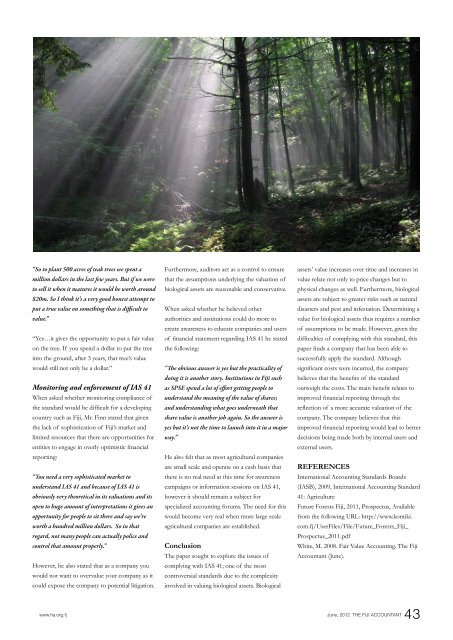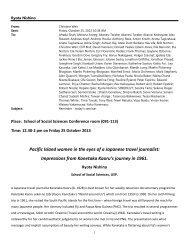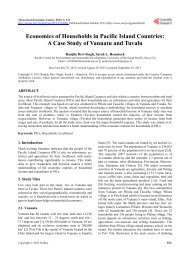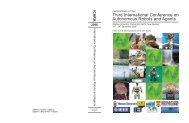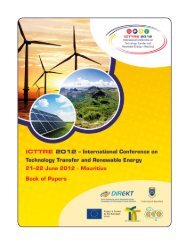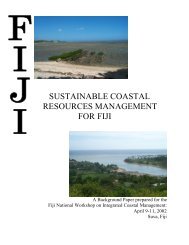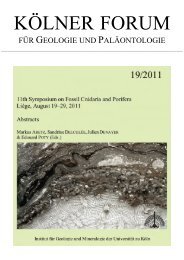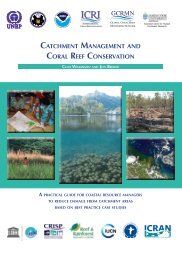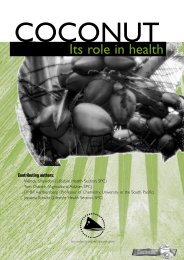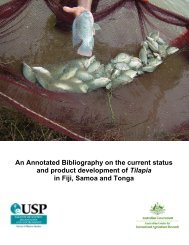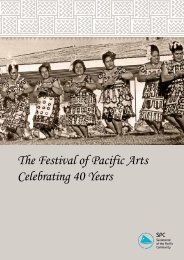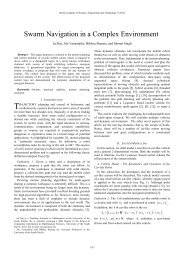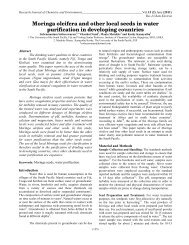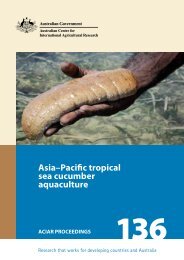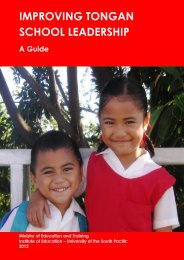Download - Fiji Institute of Accountants
Download - Fiji Institute of Accountants
Download - Fiji Institute of Accountants
Create successful ePaper yourself
Turn your PDF publications into a flip-book with our unique Google optimized e-Paper software.
“So to plant 500 acres <strong>of</strong> teak trees we spent a<br />
million dollars in the last few years. But if we were<br />
to sell it when it matures it would be worth around<br />
$20m. So I think it’s a very good honest attempt to<br />
put a true value on something that is difficult to<br />
value.”<br />
“Yes…it gives the opportunity to put a fair value<br />
on the tree. If you spend a dollar to put the tree<br />
into the ground, after 3 years, that tree’s value<br />
would still not only be a dollar.”<br />
Monitoring and enforcement <strong>of</strong> IAS 41<br />
When asked whether monitoring compliance <strong>of</strong><br />
the standard would be difficult for a developing<br />
country such as <strong>Fiji</strong>, Mr. Finn stated that given<br />
the lack <strong>of</strong> sophistication <strong>of</strong> <strong>Fiji</strong>’s market and<br />
limited resources that there are opportunities for<br />
entities to engage in overly optimistic financial<br />
reporting:<br />
“You need a very sophisticated market to<br />
understand IAS 41 and because <strong>of</strong> IAS 41 is<br />
obviously very theoretical in its valuations and its<br />
open to huge amount <strong>of</strong> interpretations it gives an<br />
opportunity for people to sit there and say we’re<br />
worth a hundred million dollars. So in that<br />
regard, not many people can actually police and<br />
control that amount properly.”<br />
However, he also stated that as a company you<br />
would not want to overvalue your company as it<br />
could expose the company to potential litigation.<br />
Furthermore, auditors act as a control to ensure<br />
that the assumptions underlying the valuation <strong>of</strong><br />
biological assets are reasonable and conservative.<br />
When asked whether he believed other<br />
authorities and institutions could do more to<br />
create awareness to educate companies and users<br />
<strong>of</strong> financial statement regarding IAS 41 he stated<br />
the following:<br />
“The obvious answer is yes but the practicality <strong>of</strong><br />
doing it is another story. Institutions in <strong>Fiji</strong> such<br />
as SPSE spend a lot <strong>of</strong> effort getting people to<br />
understand the meaning <strong>of</strong> the value <strong>of</strong> shares;<br />
and understanding what goes underneath that<br />
share value is another job again. So the answer is<br />
yes but it’s not the time to launch into it in a major<br />
way.”<br />
He also felt that as most agricultural companies<br />
are small scale and operate on a cash basis that<br />
there is no real need at this time for awareness<br />
campaigns or information sessions on IAS 41,<br />
however it should remain a subject for<br />
specialized accounting forums. The need for this<br />
would become very real when more large scale<br />
agricultural companies are established.<br />
Conclusion<br />
The paper sought to explore the issues <strong>of</strong><br />
complying with IAS 41; one <strong>of</strong> the most<br />
controversial standards due to the complexity<br />
involved in valuing biological assets. Biological<br />
assets’ value increases over time and increases in<br />
value relate not only to price changes but to<br />
physical changes as well. Furthermore, biological<br />
assets are subject to greater risks such as natural<br />
disasters and pest and infestation. Determining a<br />
value for biological assets thus requires a number<br />
<strong>of</strong> assumptions to be made. However, given the<br />
difficulties <strong>of</strong> complying with this standard, this<br />
paper finds a company that has been able to<br />
successfully apply the standard. Although<br />
significant costs were incurred, the company<br />
believes that the benefits <strong>of</strong> the standard<br />
outweigh the costs. The main benefit relates to<br />
improved financial reporting through the<br />
reflection <strong>of</strong> a more accurate valuation <strong>of</strong> the<br />
company. The company believes that this<br />
improved financial reporting would lead to better<br />
decisions being made both by internal users and<br />
external users.<br />
REFERENCES<br />
International Accounting Standards Boards<br />
(IASB), 2009, International Accounting Standard<br />
41: Agriculture<br />
Future Forests <strong>Fiji</strong>, 2011, Prospectus, Available<br />
from the following URL: http://www.kontiki.<br />
com.fj/UserFiles/File/Future_Forests_<strong>Fiji</strong>_<br />
Prospectus_2011.pdf<br />
White, M. 2008. Fair Value Accounting. The <strong>Fiji</strong><br />
Accountant (June).<br />
www.fia.org.fj June, 2012. The FiJi AccounTAnT 43


